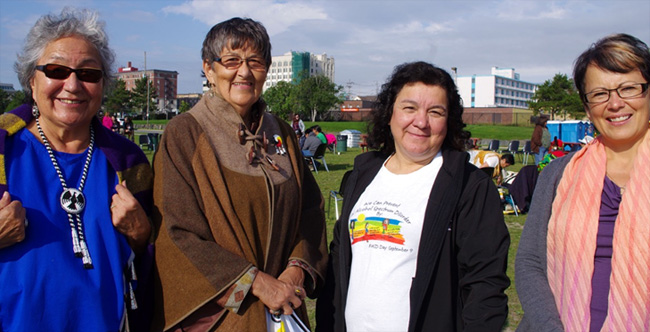Mini pow-wow raises Fetal Alcohol Spectrum disorder awareness

By Rick Garrick
THUNDER BAY – Patience is the key to parenting children with fetal alcohol spectrum disorder, according to a grandmother from Long Lake #58.
“We are very kind and loving and caring with them, but it can also become very challenging for us as adults with our children, particularly with the short-term memory,” says Elder Corrine Nabigon, who has grandchildren with FASD. “You teach them in the way we were raised and they forget, like in a few minutes, and then you have to say it over and over and be very repetitive. You have to have lots of patience, but it is fulfilling too. It’s rewarding, especially when you see them able to tie their shoes or even dry themselves off no matter what age they are after taking a bath.”
Nabigon was one of the dancers who participated in the Honouring Mothers Fetal Alcohol Spectrum Disorder Awareness Day 6th Annual Mini Pow-wow, held Sept. 9 at Marina Park in Thunder Bay. The Pow-wow featured drumming by Animi Gwiisehs, hand drumming by a group of women singers, information about FASD, giveaways and a feast at noon.
“This is our sixth annual (Pow-wow) and I think it has come a long way in raising awareness about the danger of using alcohol during pregnancy,” says Lynda Banning, FASD regional program worker for Northern Superior and Fort William First Nation citizen. “We have had sometimes over 200 people participate, so that is reaching a lot of people.”
Banning wants to see more people at the annual Pow-wow in the future.
“I would like to see more participation and more awareness of the issue of FASD and stronger support from men to help the women,” Banning says.
Health Canada warns that drinking alcohol during pregnancy can seriously harm an unborn baby. More than 3,000 babies are born each year with FASD and about 300,000 people across Canada are currently living with FASD.
“We’re dealing with a drug epidemic, but I think the rates of alcohol use is still very high, so we still need to get the message out to women, to our communities, to their partners, (about) the importance of not drinking while pregnant or actually even before you are pregnant,” says Suzanne Fitzpatrick, a Dilico Anishinabek Family Care community health nurse and Fort William First Nation citizen. “(FASD) is really misunderstood, so it is important to educate people in the community.”
Health effects from FASD include: learning disabilities, particularly in mathematical concepts; difficulty understanding the consequences of their actions; depression; obsessive-compulsive disorder; physical disabilities such as kidney and internal organ problems; and skeletal abnormalities such as facial deformities.
Fitzpatrick wants to see more support from the community for women who are pregnant or planning to have a baby.
“When a woman is thinking about having a child or is pregnant, we (need to) support her as much as we can,” Fitzpatrick says. “(We need) better support within the community and the family, especially by the partners.”

